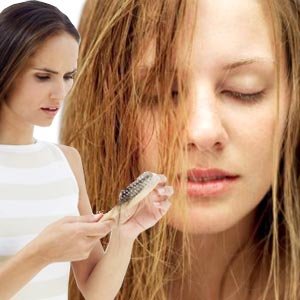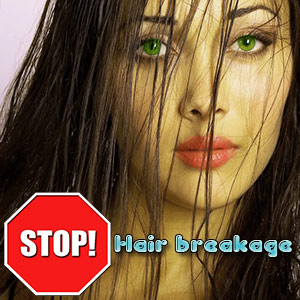Female Hair Loss

Hair is not essential for life. Yet hair means many things to women. Personality, style, health, success, social system and attractiveness for women hinge often on their luxuriant tresses. Hair loss creates tremendous psychological effects on women and most of the times leave them devastated. What are the common causes of female hair loss? What is the course of treatment for female hair loss? Are there any non-surgical and safe options to treat thinning hair in women?
Female hair loss
The American Academy of Dermatologists estimates that about 30 million women in the US are affected by hair loss. Research shows that increasing number of women lose around 20% of hair between 20 -50 years of age. While an average of 615 follicles grow per sq. cm during the 20s and 30s, the number of follicles is reduced to 485 per sq. cm by the age of 50.
Hair loss is a natural part of the body renewal process. As some hair falls out, new hair grows in its place. As hair grows older, it reaches a 'resting stage' where it simply remains on the head without growth. At the end of this stage, hair falls out. Usually it takes a minimum of 6 months for the follicles to grow in its place.
Causes of female hair loss
Though hair loss is a natural process, there are several reasons that can cause excess female hair loss.
Medical Causes: Temporary hair loss is bound to occur in women 3-4 months post illness or major surgery. Some medicines induce hair fall due to the toxicity of the drugs. Once the medicine is stopped, this type of hair loss reduces. Medicines that can cause hair loss include blood thinners (anticoagulants), medicines used for gout, chemotherapy, birth control pills and antidepressants.
All temporary hair loss or hair shedding problems are termed as 'Telogen effluvium'. Autoimmune disorders result in recurrent or episodic hair loss. Here, hair loss occurs in patches from the scalp, eyebrows and other hair bearing areas of the body. In addition, certain types of autoimmune disorders result in a slightly different and often less dramatic hair loss problem known as alopecia areata -- an inflammatory condition that causes hair to come out in clumps or patches. The 'loose Anagen syndrome' is when hair gets easily pulled out of the scalp even during normal combing.
Anemia is a major cause for hair fall in women. Hypothalamic or pituitary disorders also cause frequent hair loss in women. Hormone problems, especially the unknown estrogens and androgens that go out of balance result in excess hair loss. An overactive or under active thyroid gland disorder is bound to effect in tremendous female hair loss.
Excessive hair loss occurs 2- 3 months after delivery in pregnant mothers. During pregnancy, there are high levels of hormones that cause body to retain hair that would otherwise have fallen. Women's hair also gets fuller during pregnancy when the estrogen level is high. Once the baby is born, there is a heavy hair fall. Women experience the trauma of hair loss perimenopause or post-menopause. This is due to the fact that estrogen level in the skin declines with age. This lower level of estrogen in the body results in hair loss.
Physical / emotional causes: Improper physical handling and care of hair can result in temporary or permanent hair loss. Applying too tight hair rollers, curlers or pigtails that pull the hair strands from the roots causes hair fall. If this kind of pulling is stopped before scarring the scalp, then chances are that hair can grow back. Otherwise if scarring occurs, it would be difficult for hair to grow back and sometimes there is fear of permanent loss.
Irregular, non-professional perms, bleaching, improper brushing can also result in hair loss. Trichotillomania (compulsive hair pulling) is a psychological disorder due to emotional stress. Here again hair loss may be temporary or permanent depending upon the degree of scarring on the scalp.
Physical stress placed on the body can cause hair loss. One good example would be crash dieting. Here the woman loses large amount of weight rapidly and this may also cause her to lose her tresses also. Deficiency of proteins, essential fatty acids and minerals in food causes hair loss or hair thinning. Smoking tobacco, which contains a lot of cadmium results in loss of hair.
Genetic causes: Genetically hair loss can come from either parent sides of the family. Hair loss due to hereditary affects almost 50% of women. Genetic predisposition to hair fall is an important factor and has to be examined when the line of treatment is decided for restoration of hair.
Aging: As the woman grows older, hair thins out with age. Women tend to lose hair on the crown and at hair line. This are referred to as 'female pattern hair loss'. This is a normal part of maturing.
Environmental factors: Proximity to a mining site or working in an industry using heavy metals such as lead or mercury leads to insidious poisoning and leads to hair loss.
Treatment for female hair loss
Treatment for female hair loss can be undertaken only after the cause and permanency of the loss is diagnosed. If the hair loss is primarily due to an underlying illness, the medical examination must focus on the reason for illness and the ensuing hair loss. This is commonly done through blood tests and in rare cases scalp biopsy is done. Family medical history is also examined for any genetically prone diseases and reasons.
In any healthy women, the most common cause of hair loss is 'androgenetic alopecia' (that is production of male hormones that affect the androgenetic hormones on the hair follicle).Hence the resultant hair loss. This can be corrected by non surgical interventions, with drugs like a combination of Finasteride or Minoxidil (These are the only two drugs that are approved by the FDA).
If hair loss starts before menopause, then pill named Aldactone (Spironalactone) helps women. This pill tends to act slowly and it may take many months for hair to grow again. Pills like Prempro plus Aldactone are better after menopause. There are a number of hair growth stimulators. These drugs are available only on prescription and it is better to consult the Physician before anybody starts consuming any drugs/pills, as these pills may not have the same effect on all persons.
Surgical treatment for female hair loss
There are two surgical remedies for hair restoration:
- Hair transplantation techniques
- Scalp reduction techniques - Here devises are inserted under the skin to stretch areas of the scalp that still have hair so that the bald areas are removed. Hairy scalp is moved around the head in flaps.
The surgical options for hair restoration are extremely expensive. The surgical option may not be viable in women who have diffused hair loss throughout the head.
Natural remedies for female hair loss
A healthy diet is essential for correcting any illness, hormonal imbalances that may lead to hair loss.Multi Vitamin tablets and mineral supplements for healthy diet help to overcome the deficiency of minerals like iron, manganese, zinc and others - lack of which result in hair loss. Hair instantly responds to additions of proteins, meat, egg, cheese, seeds and nuts in diet.
B-Vitamin: Biotin is essential element for hair growth. Vitamin B deficiency results in hair loss. 5 - 8 grams of biotin taken daily can be effective in hair restoration. This has no side effects.
Saw Palmetto: a natural substance that inhibits the action of testosterone which is primarily responsible for hair loss in woman.
Omega 3 fatty acids: are found in Fish oil. Therefore deficiency of essential fatty acids that result in dry, brittle, thinning hair and loss can be combated by taking fish oil.
Personal care for female hair loss
- It would also be a good idea to cut hair short and in layers.
- Use of soft brushes instead of comb is suggested.
- Hair sprays must be avoided and a good mousse or soft gel can be used instead. Any product that is harsh on the hair has to be avoided.
- Shampooing hair at least thrice a week helps to remove dirt from the hair and maintain healthy tresses. But frequent shampooing should be avoided as it will dry out the hair. A good moisturizing regimen should be adopted for good conditioned hair. The hair shafts are replenished with nutrients thereby preventing hair loss.
- Over exposure to the sun can cause irreparable damage to hair by inducing oxidization of sulfur found in the hair shafts. Hair has to be protected from Sun block.
Female hair loss is now fully recognized as a medical and aesthetic concern that can be treated successfully. However much depends upon what woman feel about her appearance and how she wants the others to perceive her.
Top of the Page: Female Hair Loss
Tags:#Female hair loss #cause for female hair loss #treatment of female hair loss
 Hair Loss
Hair Loss Thinning Hair Remedies
Stop Hair Breakage
Damaged Hair Care
Scalp Psoriasis
Hair Loss Treatment and Hair Restoration
Female Hair Loss
Menopause and hair loss
Pattern Baldness in Women
Hair Weaving
Hair Frizz
Ingrown Hair
Hair Care in Winter
Hair Masque
Hair Detanglers
Hair Color
 Covering Grays
Covering Grays Balayage Hair Color
Blonde Hair Long
Red Hair Color
Brunette Hair Color
Hair Highlighting
Eclipting Hair Color
Different HairStyles
 Easy Hair Style
Easy Hair Style Virtual Hairstyle
Punk Hairstyle
Celebrity Hairstyle
Asian Hairstyle
Interactive Hair Style Gallery
Messy Side Braiding
Braid Hair Style
Updo Hair Style
Kid Hair Style
Bob Hairstyle
Hair Perm
Hairstyles for Long Hair
Curly Hair Style
Medium Length Hairstyles
Hair style Tips
 Hair Parting Tips
Hair Parting Tips Hairstyles to look Younger
Washing Hair
Faster Hair Growth
Hair Makeover
Curling Iron
Hair Accessory
Laser Hair Brush
Hair Gel
Hair Transplant
Hair Extension
Hair Mousse and Hairspray
Blow Drying
Hair Dryer
Cysteine Hair Treatment
Hair Straightening
Laser Hair Removal
Human Hair Wig
Dandruff Shampoo
Top of the Page: Female Hair Loss
Popularity Index: 101,781

